Custom DTH Hammer Drill Bits Manufacturer in China
We supply a comprehensive range of DTH hammer drill bits, engineered for exceptional performance and longevity in diverse rock conditions. Our bits feature high-grade tungsten carbide inserts and robust steel bodies, ensuring maximum penetration rates and wear resistance. Available in various face designs (convex, flat, concave) and button configurations to match your specific DTH hammer shank (e.g., DHD, QL, SD), they deliver superior drilling efficiency for mining, quarrying, and construction projects.
Sinodrills - Your Trusted DTH Hammer Drill Bits Manufacturer from China
Sinodrills is a trusted DTH Hammer Drill Bits Manufacturer from China, renowned for their expertise in rock drilling tools since 2006. They produce bits from superior alloy steel, featuring high-quality tungsten carbide buttons (like “Element Six” T.C carbide) for exceptional wear resistance. With optimized designs and precise manufacturing processes, Sinodrills ensures their DTH bits deliver high penetration rates and extended lifespan for various demanding applications.
Various DTH Hammer Drill Bits
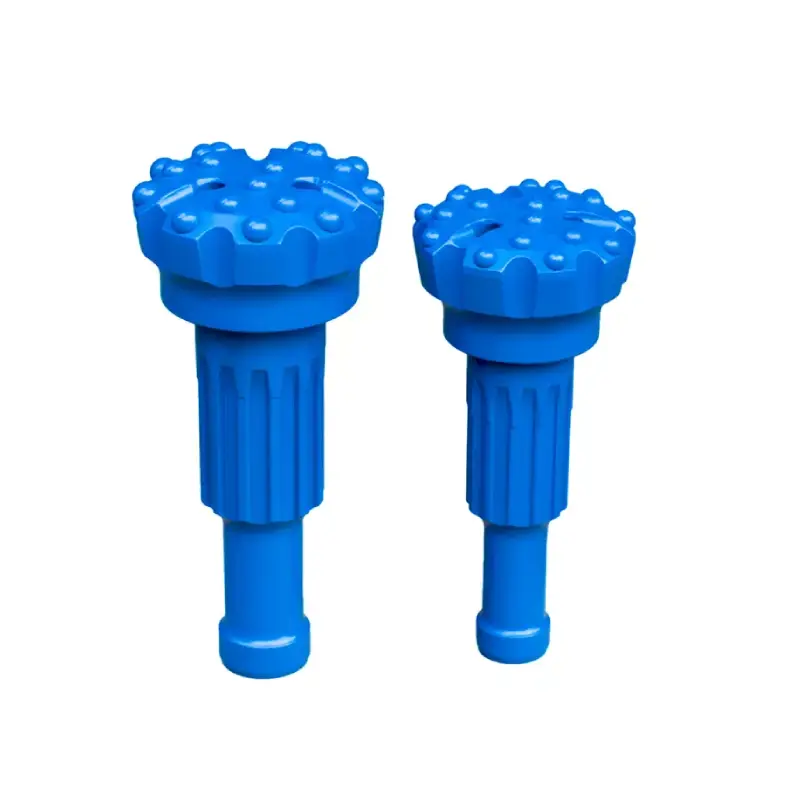
mission shank DTH hammer drill bits
We offer a diverse selection of Mission shank DTH hammer drill bits, specifically designed for compatibility with Mission series DTH hammers (e.g., M30, M40, M50, M60/65, M80). These bits feature high-quality tungsten carbide inserts and robust steel bodies for superior wear resistance and rapid penetration. Available in various face designs (flat, convex, concave) and button configurations, our Mission shank bits ensure optimal performance and extended lifespan across a wide range of rock conditions for mining, quarrying, and construction projects.
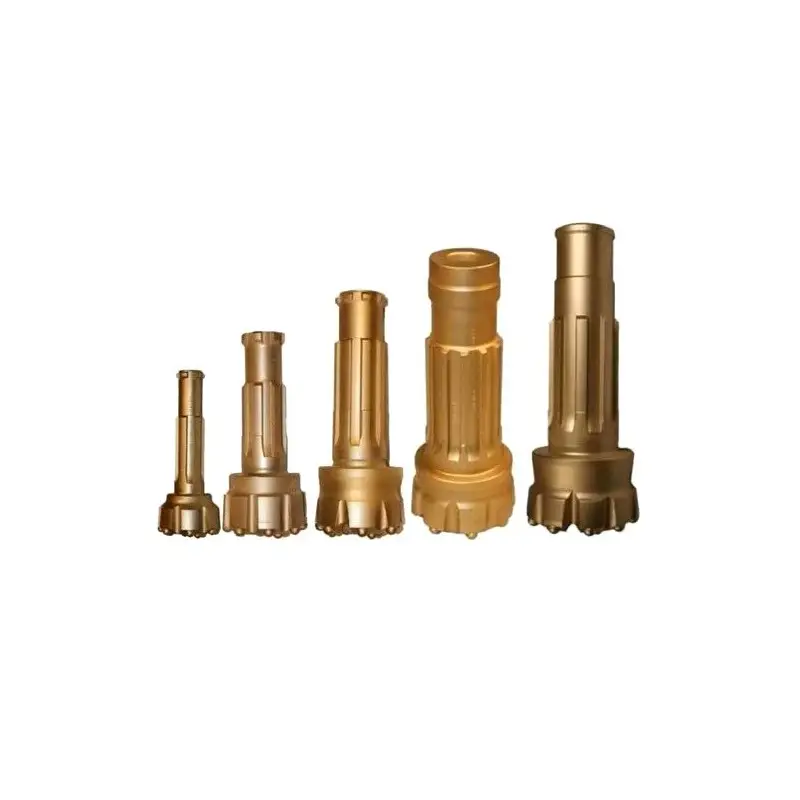
Brass DTH hammer drill bits
While brass is commonly used for drill bit components like bushings or shims due to its machinability and corrosion resistance, DTH hammer drill bits are fundamentally designed for extreme impact and abrasion in rock drilling. Therefore, the primary cutting elements and bit body are typically made from high-grade alloy steel and tungsten carbide for superior hardness and wear resistance. We offer a range of brass DTH hammer drill bits crafted from these robust materials, ensuring optimal performance and durability in demanding conditions.
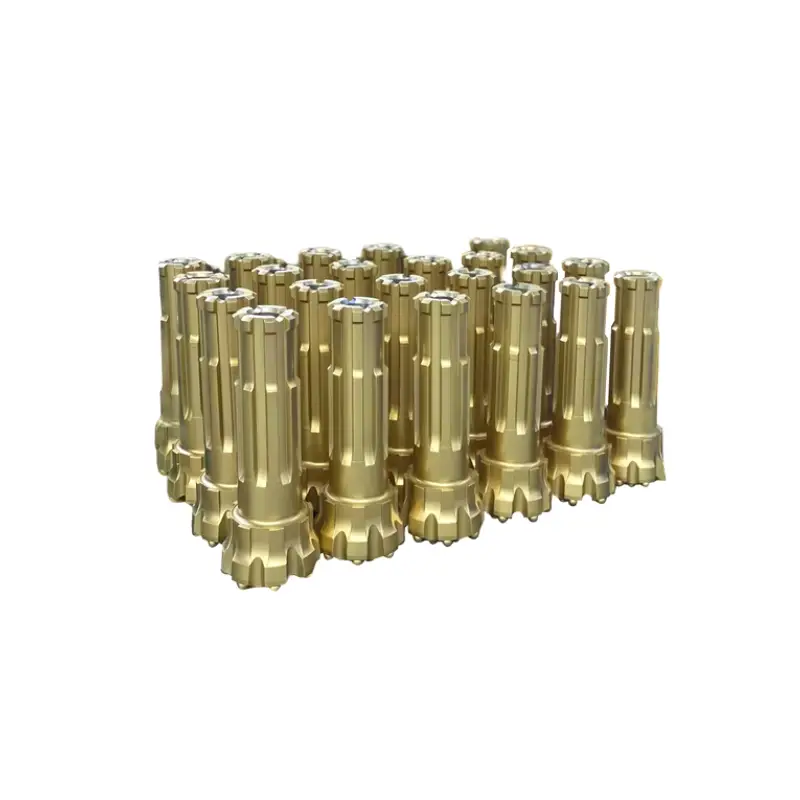
hard carbide DTH drill hammer bits
We offer a robust selection of hard carbide DTH drill hammer bits, engineered for exceptional performance in the toughest rock conditions. Our bits feature premium-grade tungsten carbide inserts (buttons) precisely integrated into durable alloy steel bodies. These hard carbide inserts provide superior wear resistance and impact strength, ensuring extended bit life and maximum penetration rates. Available with various face designs (e.g., flat, convex, concave) and button shapes (e.g., spherical, ballistic) to optimize drilling in specific formations, we guarantee a bit that will deliver consistent, efficient results for your demanding projects.
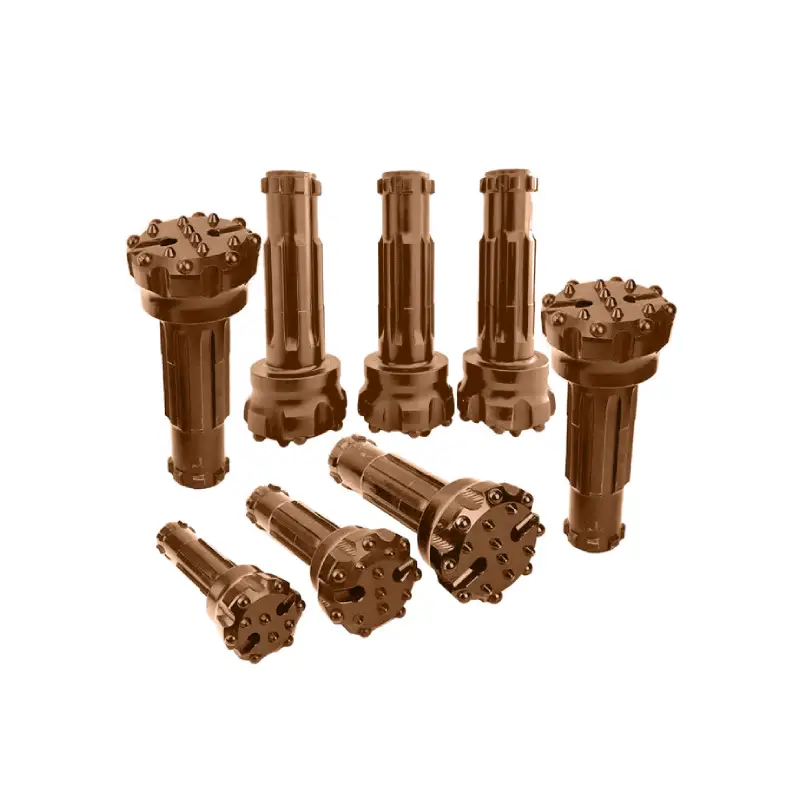
DTH drill hammer bits for mining
We offer a specialized range of DTH drill hammer bits for mining, engineered to tackle the toughest geological formations encountered in mining operations. Our bits are manufactured from robust alloy steel and feature high-quality tungsten carbide inserts, including spherical, ballistic, and parabolic buttons, chosen for their superior wear resistance and impact strength. We provide various face designs (flat, convex, concave) and shank types (DHD, QL, SD, COP) to ensure optimal compatibility and maximize penetration rates in diverse mining applications, from blast hole drilling to exploration.
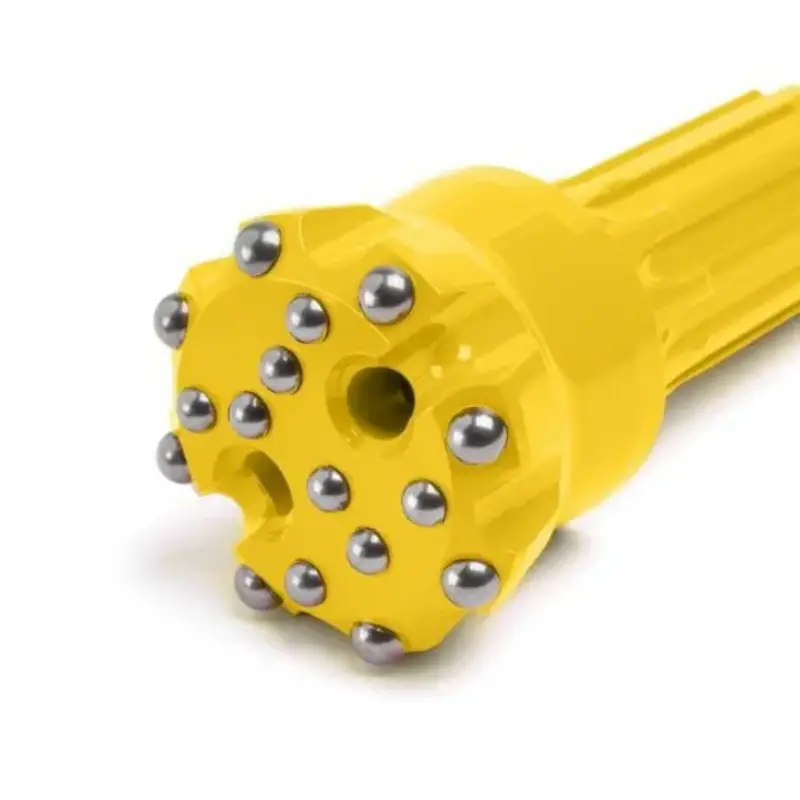
DTH drill hammer bits for rock drilling
We offer a comprehensive selection of DTH drill hammer bits specifically designed for efficient rock drilling. Our range includes bits compatible with various DTH hammer shanks (e.g., DHD, QL, SD, Mission) and in numerous diameters to suit your drilling needs. Crafted from high-quality alloy steel bodies and fitted with premium tungsten carbide inserts, our bits deliver superior penetration rates, exceptional wear resistance, and long service life across diverse rock formations.

Mining DTH drill bits
We offer high-performance mining DTH drill bits designed for deep hole drilling and tough rock formations. Our bits ensure maximum penetration, durability, and precision under demanding mining conditions. With premium tungsten carbide inserts and optimized designs, we help you achieve efficient drilling performance and longer tool service life.

drop center DTH drill bits
We offer drop-centre face DTH bits engineered for softer to medium-hard formations. These bits focus energy into a recessed centre zone for rapid penetration while maintaining manageable wear. Ideal where speed and cost-efficiency matter, they channel cuttings effectively and reduce reagent fatigue. Best for quarrying, water wells or shallow blast applications where moderate hardness occurs.

Double-gauge row (DGR) DTH drill bits
We offer double-gauge row face DTH bits built for very hard and abrasive rock. These feature two rows of gauge-buttons around the face perimeter, delivering enhanced wear resistance and prolonged lifespan. Their design supports large-diameter holes, high pressure rigs and demanding mining or foundation applications where durability and hole stability are critical under harsh conditions.

Concave/convex face DTH bit
We offer concave/convex face DTH bits combining the centring stability of concave and the aggressive penetration of convex. The mixed face shape delivers straight holes in medium-hard to hard formations and decent penetration in fractured rock. This bit supports operational flexibility when rock conditions vary, enabling fewer bit changes and improved productivity across job-site zones.
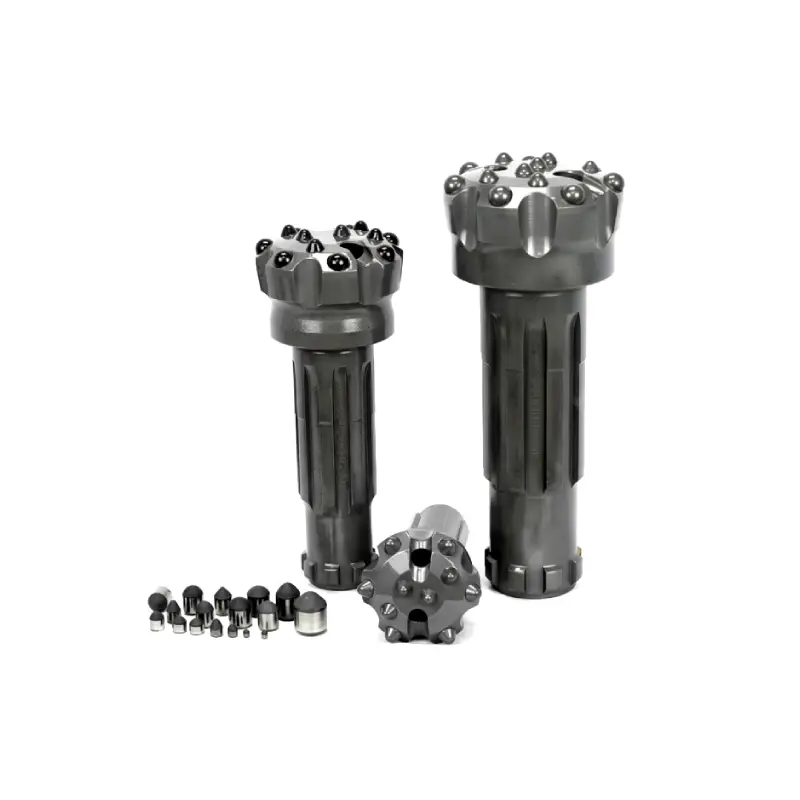
dome face DTH bit
We offer dome face DTH bits featuring a smooth, rounded face shape that distributes impact stress evenly. Particularly suited for deep-hole drilling, high-air-pressure operations and less abrasive formation conditions. The design mitigates risk of bit-head splitting or chunking, offers better structural integrity and supports longer runs in demanding depths or higher thermal loads.
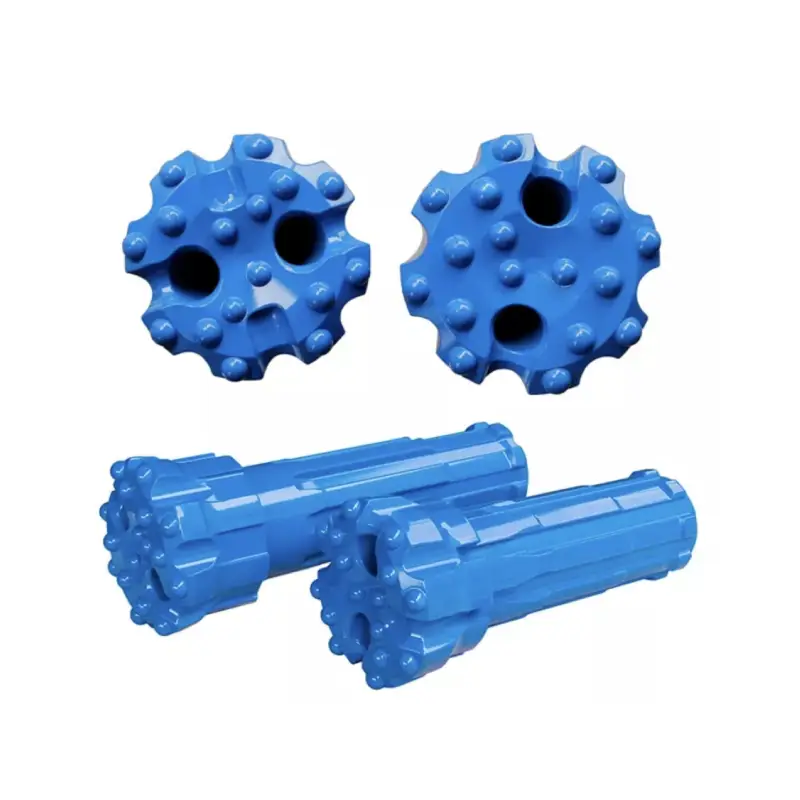
down the hole drill bits
We provide DTH drill bits tailored for your specific project needs. Whether you handle mining or quarrying, our bits ensure reliable performance across various terrains. We offer multiple face designs to maximize your productivity. You can trust our tools to deliver consistent results and long-lasting durability in the field.
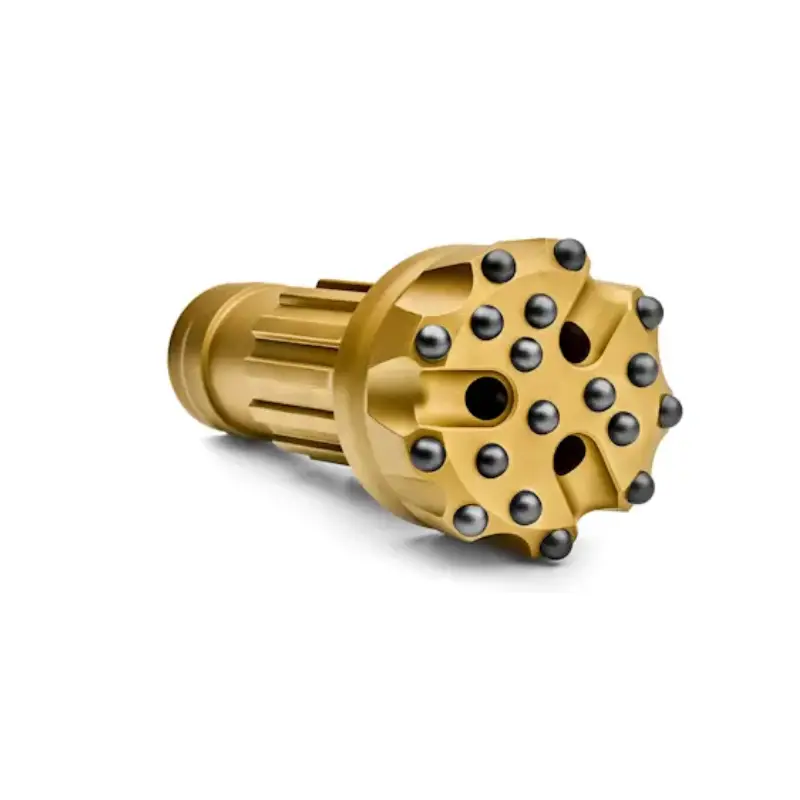
down the hole drill bits with round buttons
We provide down the hole drill bits with round buttons for maximum durability. You can rely on these tools to penetrate hard rock formations with ease. We design our bits to handle intense impact while maintaining efficiency. Explore our selection to find the perfect match for your specific drilling needs and project goals.
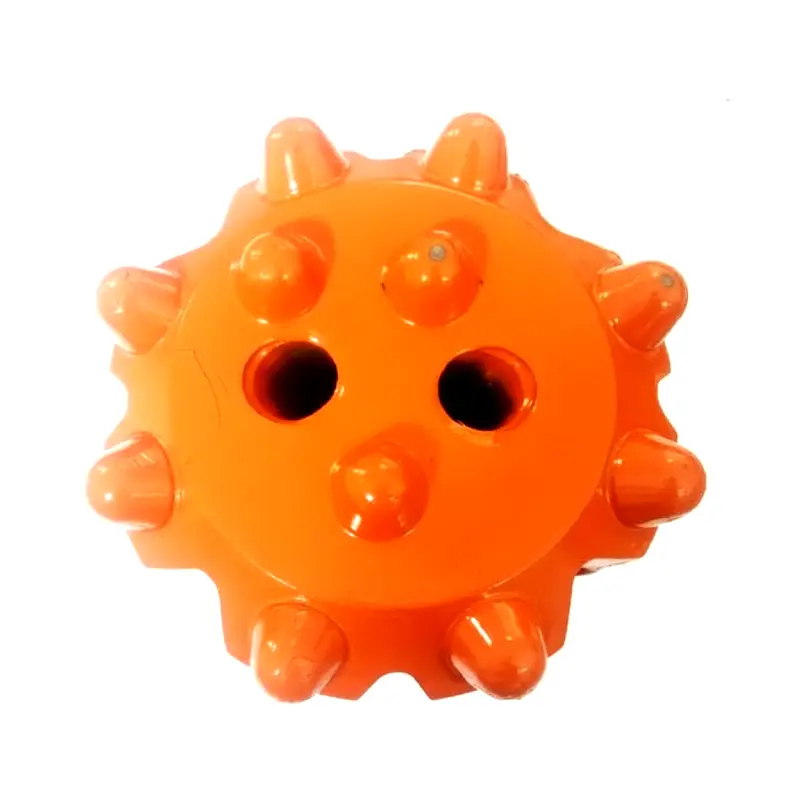
8" down the hole drill bits
Our 8″ down-the-hole drill bits are designed for efficient, stable drilling in hard rock and deep-hole applications. We offer reliable air circulation, strong impact resistance, and long service life. Suitable for mining, quarrying, water wells, and construction projects, ensuring consistent penetration and reduced downtime.
Customize Your Desired DTH Hammer Drill Bits
Face Design
The DTH drill hammer bit’s face design (e.g., flat, convex, concave) impacts hole straightness, cleaning, and penetration. We help you choose the ideal profile to match your rock type and desired drilling outcome, optimizing performance for consistency or speed.
Carbide Button Configuration
The carbide button configuration (shape, size, number, and placement) directly affects drilling speed and bit lifespan. We offer various button layouts tailored for different rock hardness and abrasiveness, ensuring maximum efficiency and durability.
Shank Type
The shank type ensures compatibility with your DTH hammer. We provide bits designed for all major hammer shanks (e.g., DHD, QL, SD, Mission), guaranteeing a secure fit and efficient energy transfer from the hammer to the bit.
Bit Diameter
The DTH drill hammer bit diameter determines the final hole size. We offer a wide range of diameters, allowing you to select the precise size required for your specific application, whether it’s blast holes, water wells, or foundation drilling.
what are DTH hammer drill bits?
DTH (Down-The-Hole) hammer drill bits are the cutting tools attached to the front of a DTH hammer, directly interacting with the rock to create a borehole. They are a critical component in the DTH drilling system, designed to efficiently break and pulverize rock formations under the rapid, powerful percussive blows delivered by the DTH hammer, combined with the rotation of the drill string.
These drill DTH bits typically consist of a robust steel body with strategically placed tungsten carbide inserts, or “buttons,” on their face. The specific design of the bit’s face, the shape and arrangement of its carbide buttons, and its overall diameter are all tailored to optimize performance in various rock types and drilling applications.
What size are DTH hammer bits?
DTH (Down-The-Hole) hammer bits are designed to create boreholes, and their “size” primarily refers to their diameter, which directly determines the size of the hole drilled. These bits are available in a very wide range of diameters to accommodate various drilling applications, from small-scale rock bolting to large-diameter piling.
The size of a DTH hammer bit is intrinsically linked to the DTH hammer it connects to. Each hammer typically has a specific “shank type” and a range of compatible bit diameters it can efficiently drive.
Common DTH hammer bit diameters range from approximately 2 inches (51 mm) for smaller applications up to 30 inches (750 mm) or even larger for specialized projects like foundation drilling or large-diameter wells. For typical blast hole drilling, a common range might be between 3.5 inches (90 mm) and 10 inches (254 mm).
Key considerations for DTH hammer bit sizes include:
- Small Diameter: Generally starting around 2-3 inches (50-75 mm), used for precise work or where smaller holes are required.
- Common Diameters: A significant portion of DTH drilling falls into the 3.5-inch to 10-inch (90-254 mm) range, suitable for mining, quarrying, and most water well applications.
- Large Diameters: Bits can go up to 30 inches (750 mm) or more for very large boreholes, often used in specific civil engineering or foundation drilling.
- Hammer Compatibility: The bit’s diameter must be compatible with the DTH hammer’s outer diameter and its ability to efficiently flush cuttings from the hole. A bit too large for a given hammer can restrict airflow and hinder performance.
Is DTH drilling better than top hammer?
It depends heavily on the specific DTH drilling hammer application, rock conditions, and project requirements. Both methods are highly effective percussive drilling techniques, but their optimal use cases differ due to how they deliver impact energy to the rock.
Top hammer drilling involves a hammer located at the surface, which transmits impact energy down the drill string to the bit. This method is generally favored for shallower holes (typically up to 15-20 meters, though can go deeper) and in softer to medium-hard rock formations.
DTH drill hammer’ advantages often include lower initial equipment costs, ease of use for smaller-scale operations, and quick setup times, making it suitable for road construction, small quarries, and tunneling where precision in shallower holes is critical. However, as hole depth increases, energy loss through the drill rods becomes more significant, leading to decreased penetration rates and potential hole deviation.
In contrast, DTH drilling places the hammer directly behind the drill bit at the bottom of the hole. This “down-the-hole” approach minimizes energy loss, allowing for consistently high penetration rates even in very deep holes and extremely hard, abrasive rock formations.
DTH drilling excels in applications requiring deep, straight, and accurate boreholes, such as large-scale mining (blast holes), water well drilling, geothermal projects, and foundation drilling. While DTH rigs and compressors can have a higher initial investment, their superior efficiency and accuracy in challenging conditions often lead to lower overall drilling costs per meter in the long run.
DTH drill hammer Benefits
DTH (Down-The-Hole) drill hammers offer a distinct set of benefits that make them a preferred choice for numerous drilling applications, particularly in hard and abrasive rock formations. Their fundamental design, which places the percussive mechanism directly at the bottom of the borehole, is the source of these advantages, translating into more efficient, accurate, and cost-effective drilling operations.
Here are the key benefits of using a DTH drill hammer:
- High Penetration Rates: The direct impact of the hammer on the drill bit delivers maximum energy to the rock, resulting in significantly faster drilling speeds, especially in hard and compact formations. This directly contributes to reduced project timelines.
- Straighter and More Accurate Holes: With the hammer located at the bottom of the hole, it helps to maintain consistent alignment, leading to exceptionally straight and true boreholes. This precision is vital for applications like foundation drilling, blasting, and deep water wells.
- Minimal Energy Loss with Depth: Unlike surface-mounted hammers, DTH hammers transmit virtually all their percussive energy directly to the bit, regardless of hole depth. This ensures consistent drilling efficiency even in very deep boreholes.
- Efficient Cuttings Removal: The exhaust air from the DTH hammer powerfully flushes rock cuttings and debris up the borehole, keeping the drilling face clean. This prevents regrinding of material, which can wear out bits prematurely and slow down drilling.
- Versatility in Rock Types: DTH hammers are highly adaptable and perform effectively across a wide spectrum of geological conditions, from medium-hard to extremely hard and fractured ground. This reduces the need for frequent equipment changes.
- Lower Running Costs (in hard rock applications): While initial setup can be higher, the efficiency of DTH drilling in hard rock, coupled with extended bit life due to direct impact, often leads to lower overall operating costs per meter over the project’s duration.
- Reduced Vibration and Noise: Compared to some other drilling methods, DTH drilling typically generates less surface vibration and noise, making it a more suitable choice for drilling in urban areas or environmentally sensitive zones.
DTH drill hammer uses
DTH (Down-The-Hole) drill hammers are versatile percussive drilling tools primarily used for efficient penetration of hard rock formations. Their ability to deliver powerful impact energy directly to the drill bit makes them indispensable across a wide range of industries where robust and precise drilling is required.
- Mining: DTH hammers are extensively used for drilling blast holes in open-pit and underground mines. This prepares rock for excavation and allows access to ore bodies, improving mining productivity.
- Quarrying: They are essential for creating boreholes to extract large blocks of stone and for preparing quarry faces for blasting. This ensures efficient and controlled stone extraction for construction and decorative purposes.
- Water Well Drilling: DTH hammers are widely employed for drilling deep wells to access groundwater sources. Their efficiency in hard rock makes them ideal for reaching aquifers in challenging geological conditions, even at significant depths.
- Construction and Geotechnical Engineering: They are crucial for various construction applications, including foundation drilling for large structures, piling for support, soil investigation, and creating anchor holes. This ensures stable and secure bases for infrastructure projects.
- Geothermal Drilling: DTH hammers are utilized in drilling boreholes for geothermal energy extraction. Their capability to drill deep and accurately in hard rock makes them suitable for accessing geothermal reservoirs for renewable energy.
Why Choose Our DTH Hammer Drill bits?
We know you need tools that withstand the most demanding drilling environments without slowing you down. Our DTH hammer drill bits feature premium grade tungsten carbide and advanced heat-treated steel to ensure exceptional durability.
We focus on maximizing your penetration rates while reducing overall operational costs, providing you with a reliable solution for any rock formation you encounter.
Superior Material Composition
We use only top-tier raw materials to manufacture our drill bits, ensuring they handle intense impact and abrasion. The refined tungsten carbide inserts provide a sharp, resilient cutting edge that maintains its shape longer. This robust construction prevents premature wear and reduces the frequency of replacements.
Enhanced Penetration Speed
You can achieve faster drilling cycles with our specialized head designs that optimize energy transfer from the hammer. We engineer the air grooves and flushing holes to clear debris efficiently, preventing clogging in the hole. This streamlined process allows you to complete your projects ahead of schedule.
Versatile Design Options
We offer a wide range of face designs, including concave, convex, and flat faces, to match your specific ground conditions. Whether you are working in hard granite or soft limestone, you can find the perfect configuration. This variety ensures we meet your unique technical requirements.
Cost Effective Longevity
By choosing our bits, you invest in a product that delivers a lower cost per foot drilled. The extended service life means you spend less on inventory and minimize downtime during bit changes. We prioritize your profitability by delivering consistent performance throughout the entire life of the tool.
Send Your Inquiry Now
All-in-one DTH Hammer Drill Bits Solutions for Your Project
We provide all-in-one DTH Hammer Drill Bits Solutions tailored for your project. Our range includes bits with various face designs, carbide button configurations, and all major shank types (e.g., DHD, QL, SD). Crafted from premium materials, our bits ensure maximum penetration rates, superior wear resistance, and longer lifespan, delivering exceptional performance across all your rock drilling applications.


